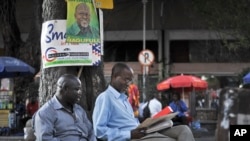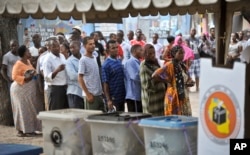Tanzania's ruling party presidential candidate John Magufuli took an early lead Tuesday, but several key cabinet ministers lost their seats as vote counting continued for Sunday's national elections.
The ministers lost to candidates representing an opposition alliance that includes Chadema, the main rival to the long-ruling Chama Cha Mapinduzi (CCM) party.
The polls are expected to be Tanzania's tightest election race ever, with CCM facing the first major challenge to its dominance in decades.
Tensions are rising between rival supporters on Tanzania's mainland and on the semi-autonomous island archipelago of Zanzibar, where there was also voting Sunday. Amid growing rancor, the election commission called for calm and warned only it can declare results.
"People should ignore announcements by other institutions and individuals," National Electoral Commission head Damian Lubuva told reporters.
Allegations fly
Chadema has alleged rigging in Sunday's presidential, general and local elections. Full results are expected Thursday.
The presidential race is the most tightly contested since Tanzania became independent in 1961. The ruling party is challenged by ex-prime minister Edward Lowassa, a CCM stalwart who recently defected to Chadema.
CCM is facing increasing pressure to speed up the country's development and deal with a persistently high poverty rate.
President Jakaya Kikwete is stepping down after completing two five-year terms, as allowed by the constitution. Tanzania has a long history of presidents observing term limits, unlike many other African countries.
Confidence over polls
Commission chairman Judge Damian Lubuva expressed confidence Sunday that the electoral process will be judged free and fair, despite reported problems at some polling stations in the country.
Appearing on a live VOA Swahili broadcast, Judge Lubuva admitted there were some discrepancies at some polling stations, including lack of voting materials, but he said there will be no repeat voting exercises, except in constituents where the process was postponed.
More than 140 international poll observer missions were in the country to monitor Sunday's presidential, parliamentary and local elections.
According to the World Bank, Tanzania's population between the ages of 14 and 25 almost doubled in 20 years — from 4.4 million in 1990 to 8.1 million in 2010. It is expected to increase to 11 million by 2020 — numbers that should be of great interest to Tanzania’s politicians, regardless of political party.






